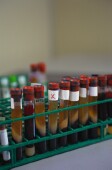
MONDAY, March 29 (HealthDay News) — High blood levels of C-reactive protein (CRP) are associated with problems in executive thinking skills, such as planning, decision-making and self-control, says a German study.
CRP is considered an indicator of inflammation.
For the study, 447 older people underwent brain scans and were given tests of verbal memory, word fluency and executive function. Overall, the average time to complete the test of executive function was 85 seconds. But participants with the highest levels of CRP took an average of seven seconds longer to complete the test than those with the lowest CRP levels.
The researchers also found that those with the highest CRP levels had brain changes equivalent to 12 more years of aging than those with the lowest CRP levels.
There was no link between CRP levels and other cognitive functions, such as memory and language.
The study is in the March 30 issue of Neurology.
“The use of aspirin and (cholesterol-lowering) statin drugs, as well as physical activity and controlling weight, can help lower CRP levels in the body, but our analyses did not consider whether therapy would be effective or not,” Dr. Heike Wersching of the University of Munster, an author of the study, said in a news release from the American Academy of Neurology.
More information
The American Association for Clinical Chemistry has more about C-reactive protein.

